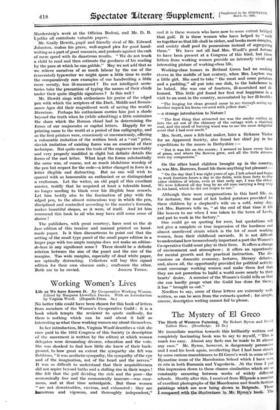Working Women's Lives
Life as We have Known It. By Co-operative Working Women. Edited by Margaret Llewellyn Davies. With an Introduction No better title could have been chosen for this book of letters from members of the Women's Co-operative Guild : it is a book which tempts the reviewer to quote endlessly, for there is nothing which can be said about it half so interesting as what these working women say about themselves.
In her introduction, Mrs. Virginia Woolf describes a visit she once paid to the 1913 Congress of this Society (a description of the movement is written by the editor) at which women delegates were demanding divorce, education and the vote. She was shocked to find how little she knew of their back- ground, to how great an extent the sympathy she felt was fictitious, "it was aesthetic sympathy, the sympathy of the eye and of the imagination, not of the heart and the nerves." It was so difficult to understand that their acquisitiveness did not aspire beyond baths and a shilling rise in their wages ! She felt that the gulf dividing the rich and the poor—the economically free and the economically insecure—was enor- mous, and at that time nnbridgable. But -these women " are not downtrodden, envious, -and exhatisted : they are humorous and vigorous, and thoroughly independent,"
and it is these women who have now to some extent bridged that gulf. It is these women who have helped to " melt us together so that life shall be richer, and books more Complex, and society shall pool its possessions instead of segregating them." We have not had -Mrs. WoolFs good fortune to have been present at a Congress of this kind, but these letters from working women provide an intensely vivid and interesting picture of working-class life. . _
Working-class houses in Bethnal Green had 'no cooking stoves in the middle of last century, when Mrs. Layton was a little girl. She used to take " the -meat and some potatoes and a pudding," all put into one dish, to the bakehouse to be baked. She was one of fourteen, ill-nourished and ill-
housed. This little girl found her first real happiness in a visit to an aunt in the country, necessitated by her ill-health ; "The longing for clean ground came tome through seeing my brother unpack his boots covered with yellow dust."
—a strange introduction to Nature I " The first thing that attracted me was the smoke curling up into the air out of the chimney of the cottage with a thatched roof, and the smell of burning wood was to me the most delightful scent that I had ever smelt."
Mrs. Scott, once a felt-hat maker, later a Sickness Visitor for an Approved Society, also found her chief joy in her expeditions to the moors in Derbyshire :— But it was life on the moors ; I seemed to know every blade of grass, and where the flowers grew, and all the little streams were my companions."
On the other hand children brought up in the country, as was Mrs. Burrows, found life there anything but pleasant :-
" On the day that I was eight years of age, I left school and began to work fourteen hours a day in the fields, with from forty to fifty other children of whom, even at that early age, I was the oldest. We were followed all day long- by an old man carrying a long whip in his hand, which he did not forget to use."
Although there were compensations in this hard life, as, for instance, the meal of hot boiled potatoes provided for these children by a shepherd's wife on a cold, rainy day, yet Mrs. Burrows tells us, " at the end of that time it felt like heaven to me when I was taken to the town of Leeds, and put to-work in the factory."
One could go on quoting for ever, but quotations will not give a complete or true impression of the hardness and almost unrelieved strain which is the lot of most working women, from their childhood onwards. It is not difficult
to understand how tremendously important a part the Women's Co-operative Guild must play in their lives. It offers a change
of environment and atmosphere ; it offers an opportunity for mental growth and for practical instruction. The dis- cussions on domestic economy, lectures, literary debates, and, above all, the opportunity provided for political activity must encourage working women and make them feel that they are not powerless to build a world more nearly to their hearts' desire. A member of the Women's Guild tells us that she can hardly gauge what the Guild has done for them ; it has " brought us out."
Needless to say, some of these letters are extremely well- written, as can be seen from the extracts quoted ; for simple, sincere, descriptive writing cannot fail to please.























































 Previous page
Previous page